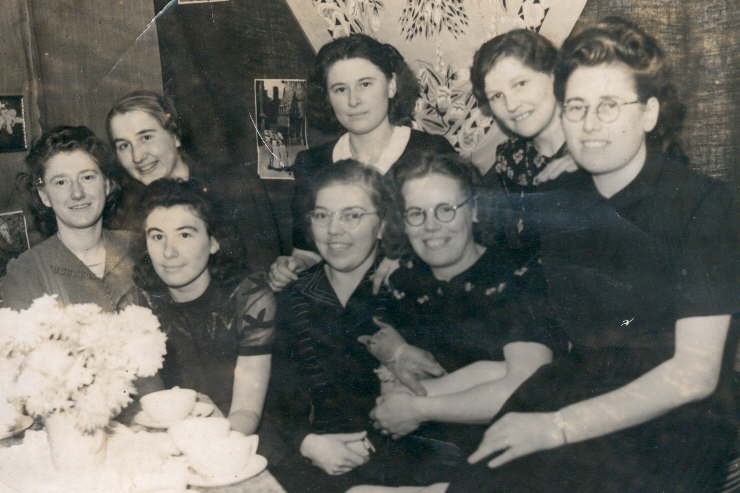In the photo, my mother is the second from the left in the front row. I believe it was taken on Guldenstraat in Groningen. My aunt Pie worked in a student house there for (wealthy) young women, and she lived upstairs herself. My mother often told me how she would go there, where other friends would gather as well. It was always a lively, cheerful place. Most likely, all the girls in the picture were housemaids.
My mother Sien was the third child in the Schoonveld family.
From the time she was little, she loved to read, but in such a busy household there was never any time for it. Before school, she and her sister Pie had to make all the beds, and afterward there were always chores waiting—mopping the floors, beating the rugs, and in the evenings shelling beans, knitting, or whatever else needed to be done. While they worked, Grandpa would sit playing his accordion or read aloud from a book.
Back then, children went to school only until the age of 13. When my mother was in seventh grade, she and her best friend—the daughter of the school principal—were allowed to follow a special course to prepare them for teacher training college. At the end of the year, their teacher, Mr. Achterhof, came to plead with Grandpa to let the two girls continue their education together. Sadly, that wasn’t possible; the family needed her to start earning money.
And so, at just 13 years old, my mother went to work as a nanny on a nearby farm. The farmer’s boys were wild and unruly, and she often came home with bruises on her legs from their kicks. The farm was a 45-minute walk from her parents’ house.
A Hard Life in Service
Later, she went to work for another farmer, this time living in. Her days began at six in the morning with hard, endless work: doing the laundry—first boiling it in a big kettle, then rinsing everything by hand in cold water, wringing it out, hanging it to dry, and finally ironing it. She also had to cook the meals and preserve the harvested vegetables in jars for the winter.
In the evenings, especially during the winter, the farmer and his wife often went out visiting friends. My mother was left to watch over their daughter and was not allowed to go to bed until they returned—often not until one or even one-thirty in the morning. And then, the very next day, she was expected to be up and ready again at six. All of this for a girl of just fifteen or sixteen years old.
She stayed there for two years, until she was let go—she had become “too expensive,” and the family hired a younger girl in her place. After that came a string of similar jobs.
When my mother turned eighteen, she decided to try her luck “in the city.” Through a placement agent—a sort of employment bureau, for which she had to pay a fee of 2.50 guilders—she found work with a fishmonger on the Zuiderdiep. Once again, it was housekeeping work. She had her evenings free, except on Saturdays when she had to be back by ten o’clock to clean the fish shop. Her wages were fifteen guilders a month.
Life at the Casimier Pharmacy
In August 1939, she went to work for the Casimier pharmacy. The lady of the house worked alongside her husband in the pharmacy and left my mother with a detailed daily schedule—planned down to the very minute! She was responsible for the entire household: every week the brass had to be polished, the wood paneling waxed, and even the picture frames had to be cleaned and waxed on a strict schedule.
My mother didn’t always follow these rules to the letter, but one thing stayed with her all her life—she grew to hate polishing brass. At home, that job always fell to me.
She was given one Sunday afternoon off every four weeks and earned twenty-five guilders a month. She remained in that household until her arrest in December 1944.
A Dream Postponed
After the war, my father and mother were married. And once again, there was no chance for her to study—there was the shop to run, a busy household to manage, and children to raise. Life simply didn’t allow for it.
Then, in the late 1970s, something new appeared: the Moedermavo, a special adult-education program designed especially for mothers. The classes were scheduled to fit around children’s school hours, and women could work toward their diploma step by step by earning partial certificates.
My mother joined, together with several of her sisters. She was passionate about it and earned excellent grades. Still, she never finished the program. She realized that it left her with less time for birthdays and other gatherings with her grandchildren—and to her, that trade-off wasn’t worth it.
But she always encouraged me to keep studying and to continue working, even with a family of my own.
Looking Back
With this story, I want to illustrate what life was like for so many girls from poor families in the 1920s and 1930s. They longed for more education, but the harsh reality condemned them to hard work from a very young age. Jacob and Rudy told the same kinds of stories, and perhaps many of you could add even more.
The younger children of Grandpa Schoonveld’s family were luckier: Aunt Bauk and Aunt Trijn were able to train as nurses. Of course, this fate also applied to the older boys in the family, though they often had more opportunities to develop themselves further through their work.
How fortunate we are that in the span of nearly one hundred years, so much has changed in this regard.
De Wilgen, September 20, 2025
Discover more from Schoonveld Family
Subscribe to get the latest posts sent to your email.

